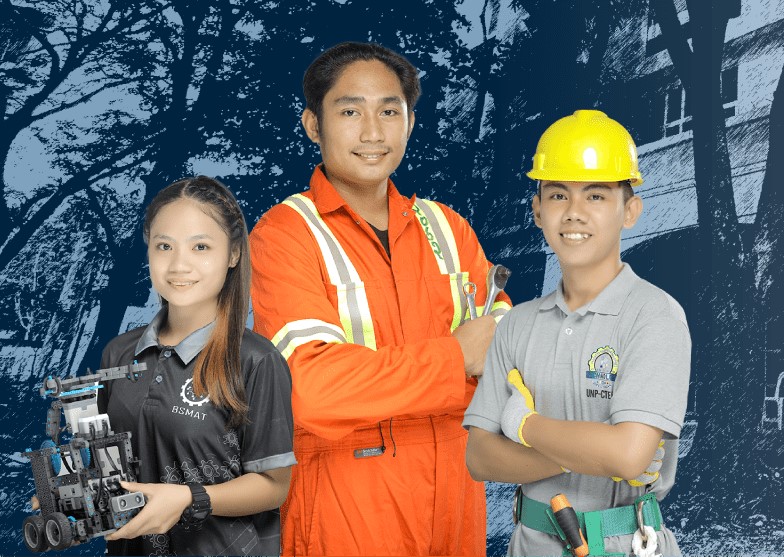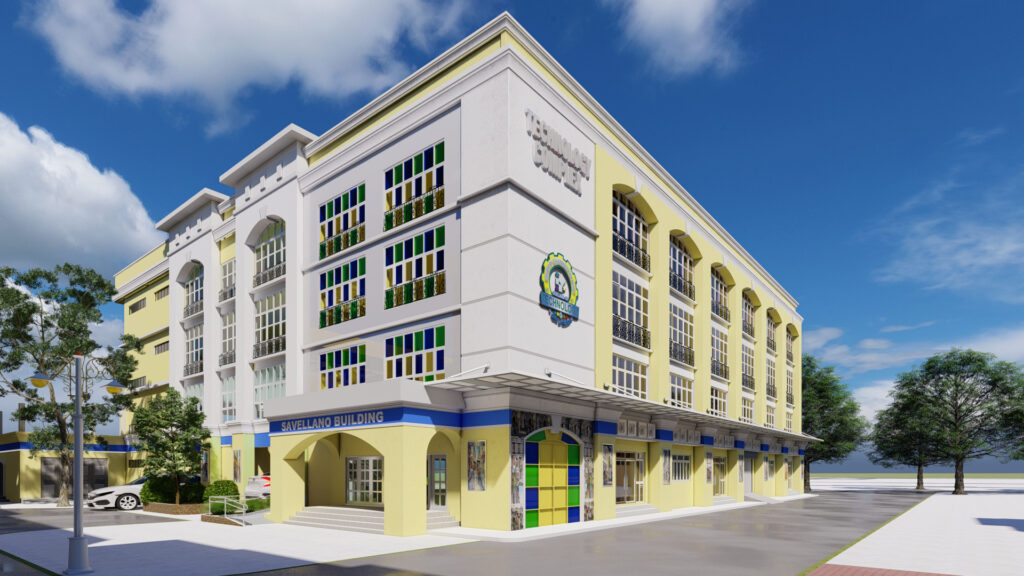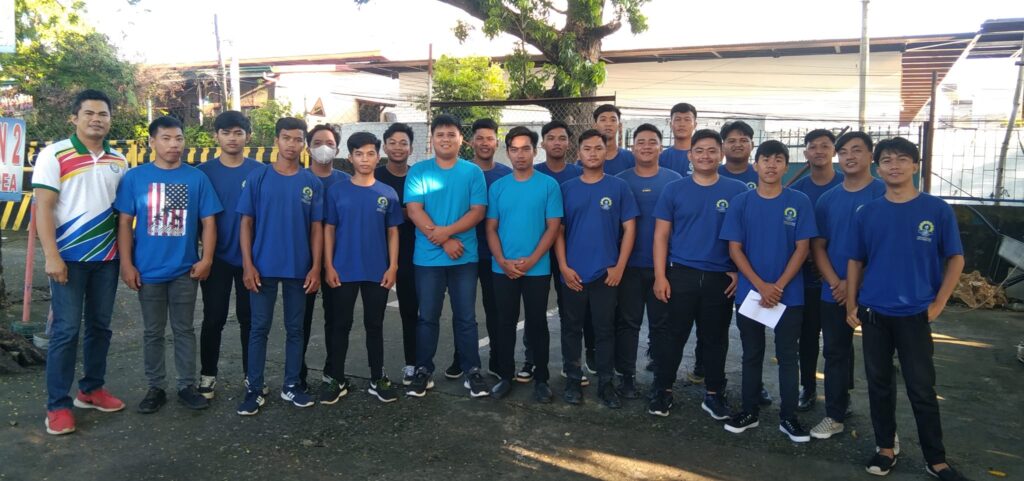About Us
The College of Technology is the first academic unit of the University, tracing its roots in the establishment of the Vigan High School in 1906 and the Ilocos Sur School of Arts and Trades. In 1970, Board Resolution No. 286 declared the offering of Electronics as a shop course in Industrial Education.
Through Board Resolution No. 298 s. 1970, the two-year Technical curriculum of the Bureau of Vocational Education was adopted with specialized course offerings in Automotive Mechanics, Electricity, and Building Construction with plumbing as a block. In 1974, Board Resolution No. 803 changed the two-year Technical curriculum to the two-year Technical Course curriculum. In 1980, the Institute of Sub-Professional Education and Cottage Industries Division (ISPECID) was created, placing all non-degree courses under its supervision. ISPECID offered the following programs; Midwifery, Medical Secretarial Science, Secretarial Science, Architectural Drafting. Commercial Arts, two-year Trade Technical Education (Automotive, Electrical and Electronics Technology), and one-year Special Courses (Auto-mechanics, Practical Electricity, and Refrigeration & Air Conditioning).
ISPECID was later converted into the Institute of Technical Education and Cottage Industries Division, offering three programs, namely: Technical Education, Midwifery, and Secretarial. Subsequently, Board Resolution No. 67 s. 1988 renamed ITECID to the Institute of Technical Education (ITE). Midwifery, Secretarial Sciences, Architectural Drafting, and Commercial Arts were transferred to the College of Nursing, College of Business Administration and Accountancy, and Institute of Architecture and Fine Arts. Technical programs were retained in ITE.
In 1995, Board Resolution No. 96 s. 1995 approved the offering of the Bachelor of Science in Industrial Technology (ladder-type curriculum). In 2006, the Institute of Technical Education (ITE) was renamed College of Technology pursuant to UNP Memorandum Circular No. 01, s. 2006 converting all institutes into colleges. In 2007, the BSIT program was certified as a Ladderized Education Program (LEP) by the Commission of Higher Education (CHED) under the provisions of Executive Order 358.
The College of Technology prepares students today for tomorrow’s workforce, developing in them well-rounded education including critical thinking and problem-solving, collaboration across networks and leading by influence, agility and adaptability, initiative and entrepreneurialism, effective oral and written communication skills, curiosity, and imagination.
For the College of Technology, these 21st century skills are more important to students now than ever before. Hence, it continuously develops students’ skills to prepare them for the industry. In so doing, the College not provides a framework for successful learning in the classroom but also ensure that students can thrive in a world where change is constant and learning never stops
Through Board Resolution No. 298 s. 1970, the two-year Technical curriculum of the Bureau of Vocational Education was adopted with specialized course offerings in Automotive Mechanics, Electricity, and Building Construction with plumbing as a block. In 1974, Board Resolution No. 803 changed the two-year Technical curriculum to the two-year Technical Course curriculum. In 1980, the Institute of Sub-Professional Education and Cottage Industries Division (ISPECID) was created, placing all non-degree courses under its supervision. ISPECID offered the following programs; Midwifery, Medical Secretarial Science, Secretarial Science, Architectural Drafting. Commercial Arts, two-year Trade Technical Education (Automotive, Electrical and Electronics Technology), and one-year Special Courses (Auto-mechanics, Practical Electricity, and Refrigeration & Air Conditioning).
ISPECID was later converted into the Institute of Technical Education and Cottage Industries Division, offering three programs, namely: Technical Education, Midwifery, and Secretarial. Subsequently, Board Resolution No. 67 s. 1988 renamed ITECID to the Institute of Technical Education (ITE). Midwifery, Secretarial Sciences, Architectural Drafting, and Commercial Arts were transferred to the College of Nursing, College of Business Administration and Accountancy, and Institute of Architecture and Fine Arts. Technical programs were retained in ITE.
In 1995, Board Resolution No. 96 s. 1995 approved the offering of the Bachelor of Science in Industrial Technology (ladder-type curriculum). In 2006, the Institute of Technical Education (ITE) was renamed College of Technology pursuant to UNP Memorandum Circular No. 01, s. 2006 converting all institutes into colleges. In 2007, the BSIT program was certified as a Ladderized Education Program (LEP) by the Commission of Higher Education (CHED) under the provisions of Executive Order 358.
The College of Technology prepares students today for tomorrow’s workforce, developing in them well-rounded education including critical thinking and problem-solving, collaboration across networks and leading by influence, agility and adaptability, initiative and entrepreneurialism, effective oral and written communication skills, curiosity, and imagination.
For the College of Technology, these 21st century skills are more important to students now than ever before. Hence, it continuously develops students’ skills to prepare them for the industry. In so doing, the College not provides a framework for successful learning in the classroom but also ensure that students can thrive in a world where change is constant and learning never stops






Goal
To prepare globally competent technicians who are sensible and imbued with the ideals and morals of a Filipino.
The College aims to produce technicians who are:
1. Equipped with concepts, technical and leadership skills;
2. Capable of conducting relevant researches aimed at improving lives;
3. Able to undertake research-based extension activities aimed at improving the quality of instruction at different levels; and
4. Self-reliant.
1. Equipped with concepts, technical and leadership skills;
2. Capable of conducting relevant researches aimed at improving lives;
3. Able to undertake research-based extension activities aimed at improving the quality of instruction at different levels; and
4. Self-reliant.
Objectives
1. develop the right attitude, knowledge and integrity, capable to work as technicians;
2. be capable of becoming managers in their field of specialization;
3. be capable of conducting technological researches for the benefit of mankind;
4. develop skills to train younger generation of their profession
5. uphold and promoted the honor and dignity of the university through honesty
6. accomplish research and extension activities to improve teaching and learning situation;
7. develop desirable ideals, values and attitudes to enhance personal discipline;
8. develop professionals who are models of moral character;
9. develop and exercise critical thinking; and
10. promote aesthetic and cultural values.
2. be capable of becoming managers in their field of specialization;
3. be capable of conducting technological researches for the benefit of mankind;
4. develop skills to train younger generation of their profession
5. uphold and promoted the honor and dignity of the university through honesty
6. accomplish research and extension activities to improve teaching and learning situation;
7. develop desirable ideals, values and attitudes to enhance personal discipline;
8. develop professionals who are models of moral character;
9. develop and exercise critical thinking; and
10. promote aesthetic and cultural values.
History
The College of Technology was basically the first academic unit of the University and could be traced through the following events:
1906. Vigan High School (now the Ilocos Sur National High School) was established.
1910. The shop department of Vigan High School was converted into a separate intermediate-level school which became the Vigan Trade School.
1927. The Vigan Trade School opened its secondary level and had its first graduates in 1931.
1932. The Vigan Trade School became the Ilocos Sur Trade School.
1941. The Ilocos Sur Trade School was converted into a regional trade school by the late President Manuel L. Quezon through the help of Assemblyman Benito Soliven and Governor Pedro Singson Reyes. World War II, however, prevented its implementation.
1951. The Ilocos Sur Trade School was converted into the Northern Luzon School of Arts and Trade through Republic Act 574.
1960. The General Appropriations Act of 1960 (R.A. 2700) converted the Northern Luzon School of Arts and Trades back to the Ilocos Sur School of Arts and Trades.
1965. R.A 4449 authored by the late Congressman Floro Crisologo made the Ilocos Sur School of Arts and Trades, the University of Northern Philippines (UNP) – the first State University of the North.
1970. UNP Board Resolution No. 286 s. 1970. Electricity was offered as a shop course in Industrial Education. UNP Board Resolution No. 298 s. 1970, the Two-Year Technician Curriculum of the Bureau of Vocational Education was adopted with specialized course offerings in Automotive Mechanics, Electricity, and Building Construction with plumbing as a block.
1974. UNP Board Resolution No. 803 s. 1974 changed the Two-Year Technical curriculum to Two-Year Technical Course Curriculum.
1980. The Institute of Sub-Professional Education and Cottage Industries Division (ISPECID) was created, supervising all non-degree courses. ISPECID, headed by the late Prof. Delfin Sumabat Jr., offered the following courses: Midwifery, Medical Secretarial Science. Secretarial Science, Architectural Drafting, Commercial Arts, Two-Year Trade Technical Education (Automotive, Electrical, and Electronics Technology), and One-Year Special Courses (Auto-mechanics, Practical Electricity, and Refrigeration & Air Conditioning).
1983. UNP Board Resolution No. 20 s. 1983 added the One-Year Special Course in Ceramics.
1984. ISPECID was later converted to the Institute of Technical Education and Cottage Industries Development (ITECID), which was later headed by Prof. Wilhelmina E. Vergara in 1985.
1987. ITECID was constructed with three programs: Technical Education Program headed by Prof. Manuel T. Ped Sr.; Midwifery Program headed by Prof. Cecilia Bayeng; and Secretarial Programs headed by Prof. Mildred Batin.
1988. UNP Board Resolution No. 67 s. 1988 renamed ITECID to the Institute of Technical Education (ITE). Midwifery, Secretarial Sciences, Architectural Drafting, and Commercial Arts were transferred to the College of Nursing, College of Business Administration and Accountancy, Institute of Architecture, and Fine Arts. Technical Courses were retained in ITE.
1995. UNP Board Resolution No. 96 s. 1995 approved the offering of the Bachelor of Science in Industrial Education (Ladder-type Curriculum).
1996. Prof. Alfredo C. Ponce became the Director of ITE when Director Vergara retired in 1996.
2001. ITE included the Bachelor of Science in Industrial Technology (Ladder Type Curriculum) course offered by virtue of UNP Board Resolution No. 96 s. 1995.
2005. The first batch of BSIT graduated.
2006. The Institute of Technical Education (ITE) was renamed College of Technology pursuant to UNP Memorandum Circular No. 01, s. 2006 duly signed by President Lauro B. Tacbas converting all institutes into colleges as agreed during the policy conference held on May 8–11, 2006 in Baguio City.
2007. The BSIT course was certified as a Ladderized Education Program (LEP) by the Commission of Higher Education (CHED) under the provisions of Executive Order 358, “Interfacing Technical–Vocational Education and Training (TVET) and Higher Education (Automotive and Electronics Technology) at Lidlida, Ilocos Sur (CUMILOS) headed by Lidlida Mayor Jesus M. Sagay. Classes were conducted at the SATRAP Bldg., Lidlida South Central School. The extension classes ended when Mayor Sagay lost in the mayoralty race in 2010. 2011. Prof. Manuel T. Ped was designated as the Dean when Prof. Alfredo C. Ponce retired on February 3, 2011. Prof. Ped led the college until he retired on July 15, 2011. Engr. Joselito A. Totaan was designated officer-in-charge until he was assigned as College Dean by virtue of Special Order No. GRA 2011–49 duly signed by the new university President Gilbert R. Arce.
2016. President Gilbert R. Arce initiated a selection process for the Deanship and Dr. Manuel A. Bajet Jr. was pronounced as the new Dean of the College of Technology.
2017. The College co-organized the 1st National Research and Development Congress on Technology and Vocational Education with the Carlos Hilado Memorial State College, Talisay, Negros Occidental.
2018. The BSIT program of the College passed the Level III Phase I accreditation by the AACCUP. Also, the College conducted the 2nd NRDCTVE again in partnership with CHMSC held in Bacolod City.
2019. The College conducted the 3rd NRDCTVE with CHMSC and an additional partner institution, the Isabela State University. Third in a row congress was made possible by the organizer-convener, Dr. Manuel A. Bajet Jr.
2020. The Commission on Higher Education granted the Bachelor of Science in Industrial Technology program of the College of Technology a Certificate of Program Compliance.
2021. The Bachelor of Science in Mechatronics and Automation Technology program was approved to be offered by the College effective SY 2021-2022 by virtue of Board Resolution No. 58 s.2021. Dr. Julius Moises S. Albalos was designated as Officer-In-Charge of the College after Dr. Bajet retired from the service by virtue of Special Order No. EFC 045, series of 2021 dated May 17, 2021, and soon designated as the full-pledged Dean pursuant to the Board Resolution No. 139 series of 2021 dated September 8, 2021, and the Special Order No. EFC 066, series of 2021 dated September 14, 2021. Also, the Bachelor of Science in Industrial Technology program achieved the Level III Accreditation Level by the AACCUP effective June 16, 2021 to June 15, 2025.
1906. Vigan High School (now the Ilocos Sur National High School) was established.
1910. The shop department of Vigan High School was converted into a separate intermediate-level school which became the Vigan Trade School.
1927. The Vigan Trade School opened its secondary level and had its first graduates in 1931.
1932. The Vigan Trade School became the Ilocos Sur Trade School.
1941. The Ilocos Sur Trade School was converted into a regional trade school by the late President Manuel L. Quezon through the help of Assemblyman Benito Soliven and Governor Pedro Singson Reyes. World War II, however, prevented its implementation.
1951. The Ilocos Sur Trade School was converted into the Northern Luzon School of Arts and Trade through Republic Act 574.
1960. The General Appropriations Act of 1960 (R.A. 2700) converted the Northern Luzon School of Arts and Trades back to the Ilocos Sur School of Arts and Trades.
1965. R.A 4449 authored by the late Congressman Floro Crisologo made the Ilocos Sur School of Arts and Trades, the University of Northern Philippines (UNP) – the first State University of the North.
1970. UNP Board Resolution No. 286 s. 1970. Electricity was offered as a shop course in Industrial Education. UNP Board Resolution No. 298 s. 1970, the Two-Year Technician Curriculum of the Bureau of Vocational Education was adopted with specialized course offerings in Automotive Mechanics, Electricity, and Building Construction with plumbing as a block.
1974. UNP Board Resolution No. 803 s. 1974 changed the Two-Year Technical curriculum to Two-Year Technical Course Curriculum.
1980. The Institute of Sub-Professional Education and Cottage Industries Division (ISPECID) was created, supervising all non-degree courses. ISPECID, headed by the late Prof. Delfin Sumabat Jr., offered the following courses: Midwifery, Medical Secretarial Science. Secretarial Science, Architectural Drafting, Commercial Arts, Two-Year Trade Technical Education (Automotive, Electrical, and Electronics Technology), and One-Year Special Courses (Auto-mechanics, Practical Electricity, and Refrigeration & Air Conditioning).
1983. UNP Board Resolution No. 20 s. 1983 added the One-Year Special Course in Ceramics.
1984. ISPECID was later converted to the Institute of Technical Education and Cottage Industries Development (ITECID), which was later headed by Prof. Wilhelmina E. Vergara in 1985.
1987. ITECID was constructed with three programs: Technical Education Program headed by Prof. Manuel T. Ped Sr.; Midwifery Program headed by Prof. Cecilia Bayeng; and Secretarial Programs headed by Prof. Mildred Batin.
1988. UNP Board Resolution No. 67 s. 1988 renamed ITECID to the Institute of Technical Education (ITE). Midwifery, Secretarial Sciences, Architectural Drafting, and Commercial Arts were transferred to the College of Nursing, College of Business Administration and Accountancy, Institute of Architecture, and Fine Arts. Technical Courses were retained in ITE.
1995. UNP Board Resolution No. 96 s. 1995 approved the offering of the Bachelor of Science in Industrial Education (Ladder-type Curriculum).
1996. Prof. Alfredo C. Ponce became the Director of ITE when Director Vergara retired in 1996.
2001. ITE included the Bachelor of Science in Industrial Technology (Ladder Type Curriculum) course offered by virtue of UNP Board Resolution No. 96 s. 1995.
2005. The first batch of BSIT graduated.
2006. The Institute of Technical Education (ITE) was renamed College of Technology pursuant to UNP Memorandum Circular No. 01, s. 2006 duly signed by President Lauro B. Tacbas converting all institutes into colleges as agreed during the policy conference held on May 8–11, 2006 in Baguio City.
2007. The BSIT course was certified as a Ladderized Education Program (LEP) by the Commission of Higher Education (CHED) under the provisions of Executive Order 358, “Interfacing Technical–Vocational Education and Training (TVET) and Higher Education (Automotive and Electronics Technology) at Lidlida, Ilocos Sur (CUMILOS) headed by Lidlida Mayor Jesus M. Sagay. Classes were conducted at the SATRAP Bldg., Lidlida South Central School. The extension classes ended when Mayor Sagay lost in the mayoralty race in 2010. 2011. Prof. Manuel T. Ped was designated as the Dean when Prof. Alfredo C. Ponce retired on February 3, 2011. Prof. Ped led the college until he retired on July 15, 2011. Engr. Joselito A. Totaan was designated officer-in-charge until he was assigned as College Dean by virtue of Special Order No. GRA 2011–49 duly signed by the new university President Gilbert R. Arce.
2016. President Gilbert R. Arce initiated a selection process for the Deanship and Dr. Manuel A. Bajet Jr. was pronounced as the new Dean of the College of Technology.
2017. The College co-organized the 1st National Research and Development Congress on Technology and Vocational Education with the Carlos Hilado Memorial State College, Talisay, Negros Occidental.
2018. The BSIT program of the College passed the Level III Phase I accreditation by the AACCUP. Also, the College conducted the 2nd NRDCTVE again in partnership with CHMSC held in Bacolod City.
2019. The College conducted the 3rd NRDCTVE with CHMSC and an additional partner institution, the Isabela State University. Third in a row congress was made possible by the organizer-convener, Dr. Manuel A. Bajet Jr.
2020. The Commission on Higher Education granted the Bachelor of Science in Industrial Technology program of the College of Technology a Certificate of Program Compliance.
2021. The Bachelor of Science in Mechatronics and Automation Technology program was approved to be offered by the College effective SY 2021-2022 by virtue of Board Resolution No. 58 s.2021. Dr. Julius Moises S. Albalos was designated as Officer-In-Charge of the College after Dr. Bajet retired from the service by virtue of Special Order No. EFC 045, series of 2021 dated May 17, 2021, and soon designated as the full-pledged Dean pursuant to the Board Resolution No. 139 series of 2021 dated September 8, 2021, and the Special Order No. EFC 066, series of 2021 dated September 14, 2021. Also, the Bachelor of Science in Industrial Technology program achieved the Level III Accreditation Level by the AACCUP effective June 16, 2021 to June 15, 2025.
Our Extension Services
The general extension program of the College of Business Administration and Accountancy (CBAA) stems and cascades from the University Extension Program.
Dubbed as “BUSINESS in the Communities,” it is a configuration of resources and positioning of the College as a potential partner in developing the communities. “Basic and Unperturbed Simulation, Integration, and Nurturing of Essential Support System (BUSINESS) in the Communities” captures the essential areas and key extension programs provided by the different programs of CBAA in emancipating the communities from poverty and empowering them in order to cushion the impact of poverty and clear the way for the families in the countryside in their efforts and sending their children to the school as they struggle to address their daily basic needs in their community.
“BUSINESS in the Communities” aims to a) provide livelihood trainings specially among the adopted barangays of the college; b) empower the communities by organizing them as business entities; c) equip and enhance the technical skills of the stakeholders (specially the parents) along the various aspects and fields of business; d) hone the leadership potentials of the stakeholders in order to create an orderly and peaceful communities driven by a desire for progress; e) provide logistical assistance to the beneficiaries; and f) source out resources through dynamic linkages for the effective and efficient implementation of the Extension Programs.
It is along these objectives, the programs under the BUSINESS in Communities are categorized into four:
Livelihood Training. This program aims to provide trainings on potential livelihood
Undertakings which are meant to provide opportunities to the adopted communities to earn for their living. Among these trainings are embotido and skinless longganisa making, hair science, and cosmetology.
Community and Business Organizing. This program aims to concretize the trainings provided by organizing the communities and assist them in forming business. Among the activities under this program are cooperative formation and organization and micro business formation.
Technical Skills Enhancement. This program aims to provide trainings on the various skills and competencies developed in the different programs offered by the college. Among such trainings are training-workshop along management, entrepreneurship, cooperative management, financial management, accounting, and other allied fields of business; financial statement preparation; and financial statement analysis and consultancy services.
Leadership Capability Training. This program aims to develop the leadership potentials and equip the various stakeholders in the adopted communities with the fundamentals of leadership, and the qualities of being in the frontline. Among the activities under this program are leadership training, participatory leadership and development, and social responsibility training.
Logistical Support. The program aims to augment the logistical needs of the beneficiaries of extension projects by providing them the necessary equipment and materials that they need in the use of their acquired skills in the Extension Activities and Projects.
Extension Resource Generation. This program aims to establish linkages with various individuals and institutions for the effective and efficient implementation of extension activities. These resources include both the human and non-human. The human resources are meant to augment the expertise available in the college. Experts in various fields who are not part of the institutional pool of the College. The non-human resources are meant to assist the beneficiaries in carrying out and executing the skills that they learned from the extension activities. These non-human resources may include: baking tools and equipment, oven gas stove, kitchen facilities, etc.
The College of Business Administration and Accountancy through its CBAA Extension Unit is responsive to the needs of the community towards sustainable socio-economic development. Its mission is to undertake extension programs and activities that promote the development of community-based business enterprises and cooperatives and enhance the entrepreneurs’ managerial competencies through consultancy services along financial, production, marketing, and human resource management and other allied areas. Likewise, it endeavors to strengthen attitudinal transformation towards greater productivity. In this manner, the clientele can achieve economic viability and competitive advantage.
OFFICE OF THE PRESIDENT
-
University of Northern Philippines
3rd Floor- Admin Building, Tamag, Vigan, Ilocos Sur - (077) 644-2261
- op@unp.edu.ph
Registrar's Office
- registrar@unp.edu.ph
- UNP Registrar's Office
Admission Services
- admissionservices@unp.edu.ph
- UNP Admission Services
Public Information Office
- pioffice@unp.edu.ph
- University of Northern Philippines
Guidance and Counseling Services
- guidance@unp.edu.ph
- University of Northern Philippines
